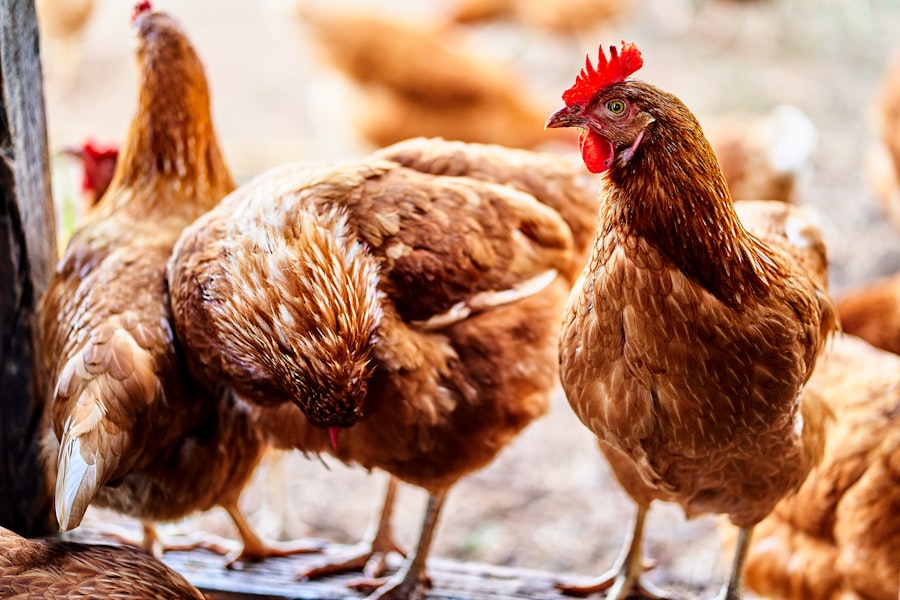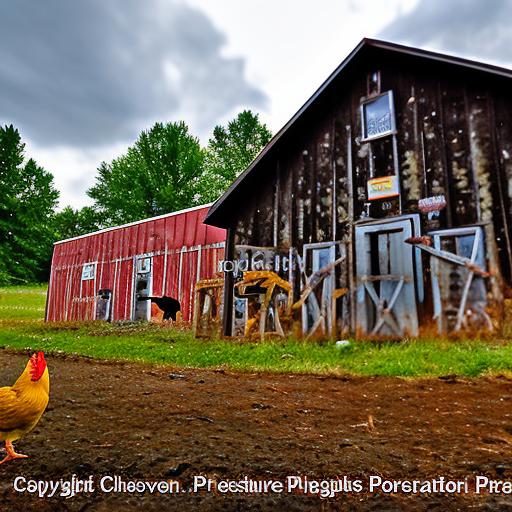Backyard chicken keeping has become increasingly popular in recent years, as more and more people are recognizing the benefits of raising chickens in their own backyard. Not only do chickens provide a sustainable source of fresh eggs, but they also offer natural pest control and fertilizer for your garden. If you live in Rochester, NH, you may be wondering if you can keep chickens in your backyard. The good news is that Rochester allows residents to keep chickens, as long as certain regulations are followed.
Key Takeaways
- Keeping chickens in Rochester, NH is possible with proper understanding of local regulations.
- It is important to choose the right chicken coop for your specific needs and space.
- Building a chicken coop can be a beginner-friendly project with the right guidance.
- Keeping chickens in your backyard can provide numerous benefits, including fresh eggs and natural pest control.
- Proper care, including feeding, watering, cleaning, and protection from predators and disease, is essential for raising happy and healthy chickens.
Understanding the Local Regulations for Keeping Chickens
Before you start building a chicken coop and bringing home some feathered friends, it’s important to understand the local regulations for keeping chickens in Rochester, NH. According to the city’s zoning ordinance, residents are allowed to keep up to six hens on properties that are at least 10,000 square feet in size. Roosters, on the other hand, are not allowed due to noise concerns.
In addition to the number of chickens allowed, there are also regulations regarding coop requirements. The coop must be located at least 25 feet from any neighboring dwelling and must be kept clean and odor-free. It should also provide adequate space for the chickens to move around comfortably and have access to fresh air and sunlight.
Choosing the Right Chicken Coop for Your Needs
Choosing the right chicken coop is essential for the health and well-being of your chickens. There are several different types of coops available, each with its own features and benefits. The most common types of coops include traditional wooden coops, mobile coops (also known as chicken tractors), and prefabricated coops.
Traditional wooden coops are a popular choice for backyard chicken keepers because they offer durability and customization options. These coops can be built to any size or design and can easily be modified or expanded as needed. Mobile coops, on the other hand, are great for those who want to give their chickens access to fresh grass and insects. These coops are typically built on wheels, allowing them to be moved around the yard. Prefabricated coops are a convenient option for those who don’t have the time or skills to build their own coop. These coops come pre-built and ready to use, but may have limited customization options.
Building a Chicken Coop: A Beginner’s Guide
If you’re interested in building your own chicken coop, it’s important to have a beginner’s guide to help you through the process. First, you’ll need to gather the necessary materials, which typically include lumber, hardware cloth, roofing materials, and nesting boxes. It’s important to choose materials that are durable and weather-resistant.
Next, you’ll need to design your coop. Consider factors such as the number of chickens you plan to keep, the space available in your backyard, and any specific features you want to include. Make sure to include proper ventilation and insulation to keep your chickens comfortable in all seasons.
When building your coop, it’s important to consider important considerations such as predator protection and easy access for cleaning. Install hardware cloth around the coop to keep predators out, and make sure there are no gaps or holes that could allow them to enter. Additionally, include features such as removable roosts and nesting boxes for easy cleaning.
The Benefits of Keeping Chickens in Your Backyard
There are numerous benefits to keeping chickens in your backyard. One of the most obvious benefits is the availability of fresh eggs. Not only do fresh eggs taste better than store-bought eggs, but they also contain higher levels of vitamins and nutrients. Plus, you’ll have the satisfaction of knowing exactly where your eggs come from and how the chickens were raised.
Chickens also provide natural pest control for your garden. They love to eat insects, slugs, and other pests that can damage your plants. By allowing your chickens to roam freely in your yard, you can reduce the need for chemical pesticides and keep your garden healthy and thriving.
Another benefit of keeping chickens is the fertilizer they provide. Chicken manure is a rich source of nutrients for your garden soil. By composting the manure and using it as fertilizer, you can improve the health and fertility of your soil, leading to better plant growth and higher yields.
How to Care for Your Chickens: Feeding, Watering, and Cleaning

Caring for your chickens involves providing them with proper nutrition, clean water, and a clean living environment. When it comes to feeding, chickens require a balanced diet that includes a combination of grains, protein, fruits, and vegetables. You can purchase commercial chicken feed or create your own mix using ingredients such as corn, soybean meal, wheat, and calcium.
In addition to their regular feed, chickens also enjoy treats such as mealworms, fruits, and vegetables. However, it’s important to avoid feeding them anything toxic or harmful, such as chocolate or avocado.
Water is another essential aspect of chicken care. Chickens require fresh, clean water at all times. Make sure to provide them with a water source that is easily accessible and regularly clean and refill it to prevent contamination.
Cleaning the chicken coop is also an important part of chicken care. Regularly remove any droppings or soiled bedding from the coop to prevent the buildup of bacteria and odors. Replace the bedding as needed to keep the coop clean and comfortable for your chickens.
Choosing the Right Chicken Breeds for Your Climate
When choosing chicken breeds for your backyard flock in Rochester, NH, it’s important to consider the climate. Some chicken breeds are better suited for cold climates, while others thrive in warmer temperatures. In Rochester’s cold winters, it’s important to choose breeds that are cold-hardy and can withstand freezing temperatures.
Some cold-hardy chicken breeds include the Rhode Island Red, Plymouth Rock, and Wyandotte. These breeds have thick feathers and small combs, which help them stay warm in cold weather. They are also known for their egg-laying abilities and friendly personalities.
If you live in a warmer climate, you may want to consider breeds such as the Leghorn, Sussex, or Australorp. These breeds are known for their heat tolerance and ability to lay eggs consistently even in hot weather.
Protecting Your Chickens from Predators and Disease
Protecting your chickens from predators and disease is crucial for their safety and well-being. There are several steps you can take to keep your chickens safe from predators. First, make sure your coop is secure and predator-proof. Install hardware cloth around the coop to prevent predators from digging under or climbing over.
Additionally, provide a secure run or fenced area where your chickens can safely roam during the day. This will protect them from aerial predators such as hawks or owls. Make sure the fencing is buried at least a foot underground to prevent predators from digging under.
To protect your chickens from disease, practice good biosecurity measures. This includes keeping your coop clean and free of droppings, regularly disinfecting feeders and waterers, and quarantining new chickens before introducing them to your existing flock. It’s also important to vaccinate your chickens against common diseases and regularly monitor their health for any signs of illness.
Tips for Raising Happy and Healthy Chickens
In addition to providing proper care and protection, there are several tips you can follow to raise happy and healthy chickens. One important aspect is socialization. Spend time with your chickens regularly, handling them gently and talking to them softly. This will help them become more comfortable around humans and reduce stress.
Exercise is also important for chickens. Provide them with plenty of space to roam and forage, either in a secure run or by allowing them to free-range in your yard. This will not only keep them physically active but also provide mental stimulation as they search for insects and other treats.
Lastly, consider providing your chickens with entertainment. Chickens are curious creatures and enjoy exploring and pecking at objects. Provide them with toys such as hanging treats or a dust bath area where they can indulge in their natural behaviors.
Enjoying the Rewards of Backyard Chicken Keeping in Rochester, NH.
Keeping chickens in your backyard in Rochester, NH can be a rewarding and fulfilling experience. Not only do chickens provide a sustainable source of fresh eggs, but they also offer natural pest control and fertilizer for your garden. By understanding the local regulations, choosing the right coop, and providing proper care and protection, you can enjoy all the benefits that come with raising chickens in your own backyard. So why not consider joining the growing trend of backyard chicken keeping and start enjoying the rewards today?
If you’re considering keeping chickens in Rochester, NH, you may also be interested in learning about duck mating season. Poultry Wizard has a helpful article on when duck mating season occurs and what to expect during this time. Understanding the breeding habits of ducks can provide valuable insights for chicken owners as well. Check out the article here to learn more. Additionally, if you’re looking for a convenient way to keep chickens without the commitment of building your own coop, Poultry Wizard offers a unique service where you can rent a chicken coop. Find out more about this innovative concept here. Lastly, if you’re wondering about the ideal size for a chicken coop door, Poultry Wizard has an informative article that discusses the factors to consider when determining the right door size for your coop. Discover more about chicken coop door sizes here.
FAQs
What are the regulations for keeping chickens in Rochester, NH?
According to the city’s zoning ordinance, residents are allowed to keep up to six chickens on their property as long as they comply with certain regulations, such as keeping the chickens in a secure coop and run and ensuring that the coop is at least 25 feet from any neighboring dwelling.
Do I need a permit to keep chickens in Rochester, NH?
No, you do not need a permit to keep chickens in Rochester, NH. However, you must comply with the city’s zoning ordinance regulations.
What kind of housing do I need for my chickens?
You will need a secure coop and run for your chickens that provides adequate space for them to move around and roost. The coop should be well-ventilated and protected from predators, and the run should be fenced in to prevent the chickens from wandering off your property.
What kind of feed do chickens need?
Chickens require a balanced diet that includes a mix of grains, protein, and minerals. You can purchase commercial chicken feed at a feed store or online, or you can mix your own feed using ingredients like corn, wheat, soybean meal, and oyster shells.
Do I need to provide my chickens with water?
Yes, chickens require access to clean water at all times. You can use a waterer specifically designed for chickens or a shallow dish that is easy for them to drink from.
What should I do with chicken waste?
Chicken waste can be composted and used as fertilizer for your garden. However, it is important to handle it properly to prevent the spread of disease. You should wear gloves and a mask when handling chicken waste and avoid using it on edible crops that will be consumed raw.
Meet Walter, the feathered-friend fanatic of Florida! Nestled in the sunshine state, Walter struts through life with his feathered companions, clucking his way to happiness. With a coop that’s fancier than a five-star hotel, he’s the Don Juan of the chicken world. When he’s not teaching his hens to do the cha-cha, you’ll find him in a heated debate with his prized rooster, Sir Clucks-a-Lot. Walter’s poultry passion is no yolk; he’s the sunny-side-up guy you never knew you needed in your flock of friends!







